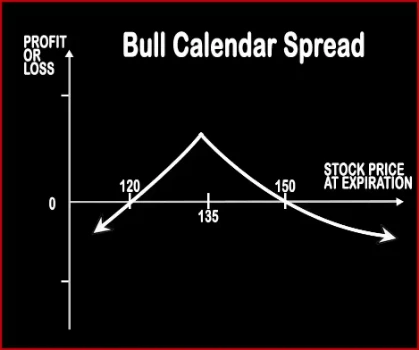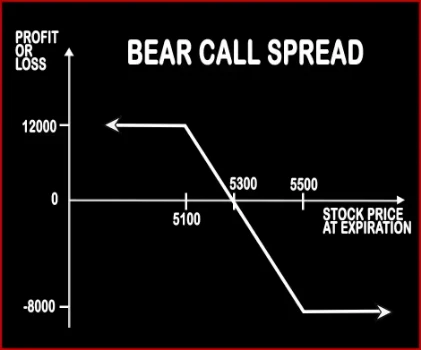Compare Strategies
| BULL CALENDER SPREAD | BEAR CALL SPREAD | |
|---|---|---|

|

|
|
| About Strategy |
Bull Calendar Spread Option StrategyThis strategy is implemented when a trader is bullish on the underlying stock/index in the short term say 2 months or so. A trader will write one Near Month OTM Call Option and buy one next Month OTM Call Option, thereby reducing the cost of purchase, with the same strike price of the same underlying asset. This strategy is used when a trader wants to make prof |
Bear Call Spread Option StrategyBear Call Spread option trading strategy is used by a trader who is bearish in nature and expects the underlying asset to dip in the near future. This strategy includes buying of an ‘Out of the Money’ Call Option and selling one ‘In the Money’ Call Option of the same underlying asset and the same expiration date. When you write a call, you receive premium thereby r .. |
BULL CALENDER SPREAD Vs BEAR CALL SPREAD - Details
| BULL CALENDER SPREAD | BEAR CALL SPREAD | |
|---|---|---|
| Market View | Bullish | Bearish |
| Type (CE/PE) | CE (Call Option) + PE (Put Option) | CE (Call Option) |
| Number Of Positions | 2 | 2 |
| Strategy Level | Beginners | Beginners |
| Reward Profile | Unlimited | Limited |
| Risk Profile | Limited | Limited |
| Breakeven Point | Stock Price when long call value is equal to net debit. | Strike Price of Short Call + Net Premium Received |
BULL CALENDER SPREAD Vs BEAR CALL SPREAD - When & How to use ?
| BULL CALENDER SPREAD | BEAR CALL SPREAD | |
|---|---|---|
| Market View | Bullish | Bearish |
| When to use? | This strategy is used when a trader wants to make profit from a steady increase in the stock price over a short period of time. | This strategy is used when you are bearish in market view. The strategy minimizes your risk in the event of prime movements going against your expectations. |
| Action | Sell 1 Near-Term OTM Call, Buy 1 Long-Term OTM Call | Buy OTM Call Option, Sell ITM Call Option |
| Breakeven Point | Stock Price when long call value is equal to net debit. | Strike Price of Short Call + Net Premium Received |
BULL CALENDER SPREAD Vs BEAR CALL SPREAD - Risk & Reward
| BULL CALENDER SPREAD | BEAR CALL SPREAD | |
|---|---|---|
| Maximum Profit Scenario | You have unlimited profit potential to the upside. | Max Profit = Net Premium Received - Commissions Paid |
| Maximum Loss Scenario | Max Loss = Premium Paid + Commissions Paid | Maximum Loss = Long Call Strike Price - Short Call Strike Price - Net Premium Received |
| Risk | Limited | Limited |
| Reward | Unlimited | Limited |
BULL CALENDER SPREAD Vs BEAR CALL SPREAD - Strategy Pros & Cons
| BULL CALENDER SPREAD | BEAR CALL SPREAD | |
|---|---|---|
| Similar Strategies | The Collar, Bull Put Spread | Bear Put Spread, Bull Call Spread |
| Disadvantage | • Limited profit even if underlying asset rallies. • If the short call options are assigned when the underlying asset rallies then losses can be sustained. | • Limited amount of profit. • Margin requirement, more commission charges. |
| Advantages | • Limited losses to the net debit. • Enable trader to book profit even if underlying asset stays stagnant. • If the market trends reverse, cashing in from stock price movement at limited risk. | • This strategy takes advantage of time decay. • Investors can get profit in a flat market scenario. • Investors can earn options premium income with a lower degree of risk. |